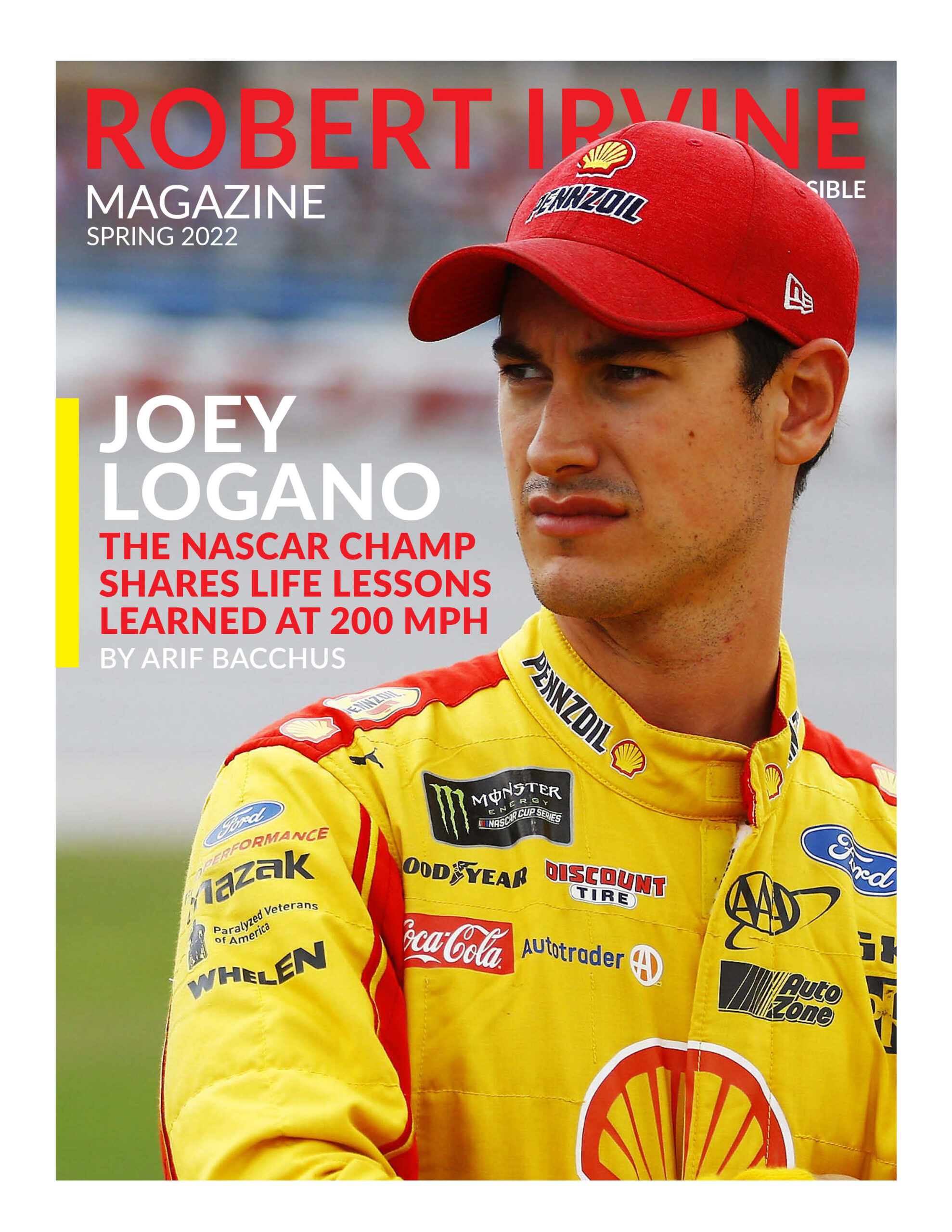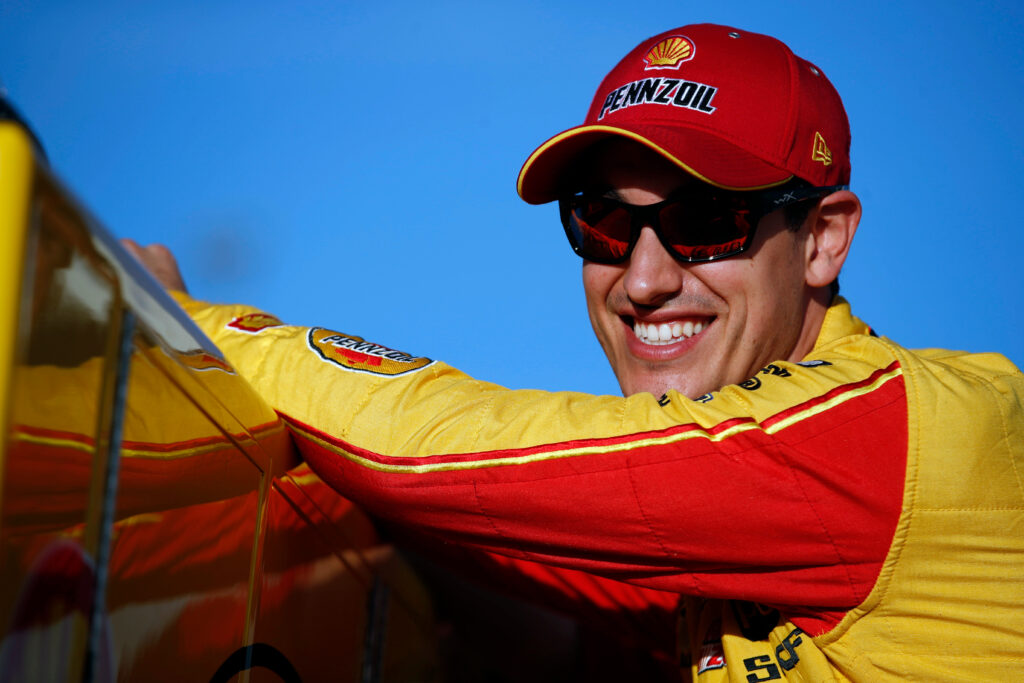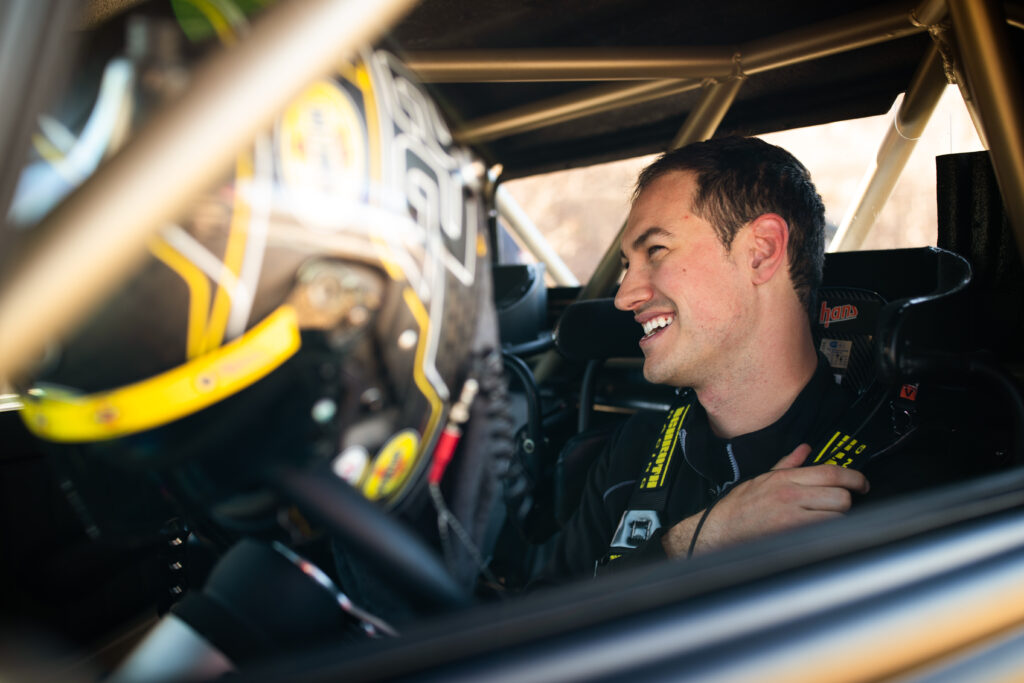
INTERVIEW: JOEY LOGANO
The NASCAR Cup Series champion shares life lessons learned on the track.
BY ARIF BACCHUS
The 2018 NASCAR Cup Series Champion Joey Logano isn’t your typical race car driver. The 32-year-old Middletown, CT native kicked off the modern “youth” wave in NASCAR’s top level and is one of the youngest drivers to win a race and a pole award.
Now a Cup Series veteran with over 50 NASCAR wins, including the Daytona 500, Logano chatted with RI Magazine about his rise through the ranks and life lessons learned on the track.
RI Magazine: What inspired you to be a race car driver?
Joey Logano: I’m very lucky to find a passion at a young age. I love cars. Loved to play with Hot Wheels. Santa Claus brought me a go-kart this one year and that was it. I would drive my go-kart every single day. I wouldn’t skip a beat. I’d get home from school, and I jump in my go-kart.
I would bomb around the yard and in the neighbor’s yards and hit their mailboxes. I was a neighborhood terror. My parents recognize that I loved it. I tried other sports and I didn’t enjoy it as much. I found something that I really liked. I really liked pushing cars to an edge and pushing myself and getting the adrenaline that goes along with that.
Like a lot of other stock car drivers, I first got a quarter midget race car (a small car with a high power-to-weight ratio) when I was six and it was my first kind of younger form of racing. I then started running those things for a while and then started moving up through the ranks quickly from there.
It is following my passion, following what I love doing, and nothing’s really changed today.
RI: Everyone has a journey. What is it like working your way up the ranks while guys like Jeff Gordon and Jimmie Johnson, guys you must’ve grown up watching, were still there?
JL: It is a kind of a surreal feeling and also kind of intimidating. Honestly, I was getting my butt handed to me. They were better than I thought they were, and it forced me to work on my craft.
Up until that point I was relying on talent to get me through the ranks and then when you get to the top level at any sport, everyone has a lot of talent and their intelligence level of the sport is what changes and makes the difference of someone who runs 15th or 20th to end up winning races.
You just have to start becoming more of a student of the sport and working on your craft and eventually kind of move up through the rank and get there where you can start winning. That’s what’s special. That’s what makes it so hard to do it.
RI: If you weren’t a driver, what would you be doing in life?
For me, I put all my eggs in one basket. This was it for me. It was, “I am going to be race car driver or bust.” I don’t know if that’s the best advice, but for me it was the best advice because I made it so that this just had to work. This was it from the beginning for me.
So, if you have 100% focus on something you’re going to be pretty damn good at it. That was kind of what it was like for me. Just follow that that path. But if I wasn’t a driver, I don’t know … never put much thought into it.

A decade ago, Logano was recognized as one of NASCAR’s hottest rising stars. He has delivered on the hype, and has now won has now won 27 NASCAR Cup Series races including the 2015 Daytona 500. In 2018, he won his first Cup Series Championship.
RI: How do you tackle stress? You drive at 200 MPH each week and are door to door with fellow drivers. Sometimes in a race you might even just end up stuck. Your car might not perform, or your crew might make a mistake that costs you. How do you tackle that adversity?
JL: Repetition. This is probably the biggest thing. At this point, I’ve been through a lot of different situations. I’ve handled it the wrong way enough times to know how to do it the right way … which helps. But also, I think understanding the big picture probably is a big piece of it. In a 500-mile race or 400-mile race, you’re going to have some adversity at some point. It’s going to be a matter of how you handle it. You can let the snowball keep getting bigger as it goes down the hill or you can stop it and turn something around before it gets too big.
RI: Pressure is everything in sports, and in life, too. What was it like being the replacement for NASCAR legend Tony Stewart at Joe Gibbs Racing at such an early point in your career?
JL: I love pressure, I love it. I apply pressure in situations I don’t even need to. You know, it’s just something that I think makes you better. It goes back to one of favorite my favorite quotes I’ve heard. I go to church at Elevation Church and a pastor said, “Pressure is a Privilege.” There was a whole sermon about it. It has stuck with me for a long time now.
You think about it, I’d much rather have pressure on me than live a life without pressure. You can’t move forward without pressure a lot of times. Think of it from a playoff scenario. I mean if you miss the playoffs then all the pressure is off but if you’re not in the playoffs then, that sucks.
I’d much rather be in the pressure situation, and I think it also brings the best out of you. When you’re forced to do something special, a lot of times you’ll find a way to do it. If there’s no pressure on you to do it, then you’re probably not going to bring the same intensity level.
It’s just a natural thing right? To the whole analogy of “you never know how fast you’re going to run until you run from a bear?” It is kind of the same scenario when it comes to the intensity level.
RI: There’s a funny irony to being in motorsports: everything happens as fast as possible, but it’s also a marathon. Races are long, seasons are long, how do you handle it all?
JL: I am kind of one of those people who just lives with a lot of energy and can’t just sit still very long. Any day when I have a little bit of time, I am always doing something. There’s not much time when I sit down and turn on a TV. This is not who I am. So, I am constantly going, being charged up. It isn’t much of an issue.
RI: How do you manage burnout? If you’re feeling totally spent, what do you do to recharge the batteries and regain your motivation?
JL: There are times in athlete’s careers, and in my career as well, where you go through a slump right where you haven’t won in a while, where things aren’t going the way you expect it
or plan them to. Those are challenging times that you have to find ways to work through.
That’s when you have to go back and first always look inward before outward and then look into your weaknesses and try to fix them. Even if it’s not in my department, I think as a leader sometimes you got to look at every area to try and improve as a driver. So, you work on your own craft first, but part of my leadership role is looking at every part of our race team.
When you look at it, there’s so many different departments in our race team. Right now, there’s manufacturing, there’s engineering, there’s athletic departments, there’s marketing departments, there’s transportation departments, you name it. It is a bunch of little businesses in one and as a driver you need to touch on all of it.
RI: What advice do you have for readers who don’t have any racing aspirations but want to make it to the top of their field?
JL: Focus on yourself. It’s so easy in my sport to get focused on what other people are doing. And looking over it, someone else’s car and say “oh, they’re doing this differently.”
It is just easy to start looking at others and comparing yourself. And what I found in racing, and I think this applies in life, is that what it takes to make JL be a winner in racing or Team Penske to be a winner in racing is just going to be different than what it takes for Hendrick or Kyle Larson or Chase Elliott, or whoever.
RI: Some people like praise. But praise can also make you get in over your head. NASCAR legend mark Martin once said you’re the real deal. How’s that’d make you feel?
JL: It’s special. When someone like Mark Martin who is respected in our industry so much says something like that that it was a real special thing. That was when I was 15 years old and when I was coming up to the ranks. When he said that it propelled my career quite a bit. That was a kind of a pivotal moment in my career.
Those things are special but one of my favorite Roger Penske quotes is this. He’ll say it every time we win, “Don’t trip on your press clippings.”
I feel like that is something that is so true. You can’t rely on what you did in the past. You can’t rely on what someone said about you in the past. It changes so quickly.
RI: Any advice on ignoring detractors and staying focused?
You have to find what makes you work, what makes you tick what makes you win. You have to find your way. It doesn’t mean to not to look over your shoulder now and again and see how others are doing it and try to apply that in the right way but I think you have to find what makes you the best, right? I always honestly get offended if someone ever says to me: “Hey, you’re going to be the next Jeff Gordon,” or the next whoever. Like no, I’m going to be the next JL! That’s who I’m going to be. I think that attitude and finding confidence in yourself and obviously with some humility attached to that is important. I think, in all aspects of life.
RI: Making mistakes, crashing – that’s part of being a driver. Did you learn from your mistakes?
JL: Absolutely! All the time, on and off the track. To the point of it though, you got to make mistakes. It’s okay! You can never be scared to make a mistake. As long as you learn from it, you’re better right?
In our sport, it’s hard to say, you know, “winning and losing.” How do you define losing? Sometimes you might not win the race, but you learn something, so did you really lose? But making mistakes . . . as long it’s the first time I am making a mistake I’m better because of it.
RI: Sometimes you run into enemies and rivalries. You had quite a few of these in your career. There’s Harvick and Hamlin and a few others. How do you keep your head clear and deal with rivals?
JL: There’s 40 drivers out there and only one wins. That means there’s 39 pissed off race car drivers. If you’re really close to winning and didn’t win, yeah, you’re going to get angry. It is just life, and understanding their perspective is the bigger thing.
You’ve got to put yourself in their shoes. I didn’t do a good job with this early in my career, but I feel I am better at this now. This and understanding what you would do in their scenario. I think the biggest thing is trying to understand both sides of the story and talk through it and come to some kind of conclusion because you don’t want to go out there and start wrecking race cars one after another.
At that point it is hurting. Hurting your whole race team. So, you just got to come to some kind of conclusion where you can move forward and race again.
RI: NASCAR is of is one of those unique sports where faith and prayer plays an important role for a lot of the drivers. Does it for you?
JL: I think everyone’s faith is obviously their decision and what they choose to do with your life, but for me it is God and family as the things you put up there first.
I feel like our industry is pretty special when you think of it. What other sporting event does a prayer for the whole stadium, and for all of America to see? On TV? There’s no other sport that does that. I feel like that is something special and it stays true to our roots of the things our sport stands for. I think that’s something that I always cherish about NASCAR.
RI: You’re still young and you have time left in your career, but is retirement ever on your mind? What would be next for you if you decide to retire?
JL: That’s a hard thing to answer. Right now, I’m here, but obviously, I would spend a lot of time with my family, but I don’t think I’d ever stop working. I think I’m going to be working on something until I’m done. I’m a pretty big believer in, “If you don’t use it, you lose it.”
And so I feel like I need to stay fresh and keep up with the whole pressure thing. I’m used to that. I think I’m going to feel empty without it so I think I’d find ways to push myself still. I can’t honestly answer what that is completely yet, but I will still get out of bed early and hammer down all day. I know that because I just want to live life to the fullest.
Arif Bacchus is a journalist with a focus on Microsoft products and other tech. A native New Yorker, he is a long-time NASCAR fan and long-suffering Mets fan. He can be reached on Twitter and LinkedIn.


